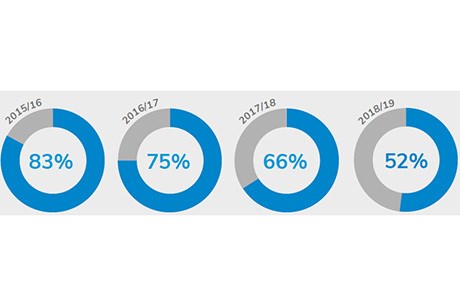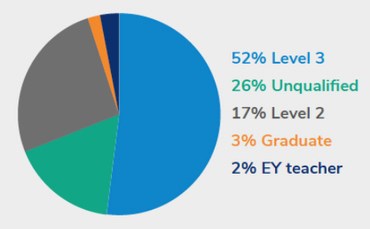Qualification levels of nursery staff drop dramatically
Wednesday, June 26, 2019
The proportion of nursery staff qualified to Level 3 or above has fallen to such an extent in the last four years that it threatens the quality of provision, the National Day Nurseries Association has warned.

Findings from the NDNA's 2018/19 workforce survey show that just 52 per cent of staff are qualified to Level 3 – a drop from 83 per cent in the 2015/16 survey.
The association's chief executive Purnima Tanuku described the situation as 'a full-blown crisis' and said a less-qualified workforce could undermine nurseries' efforts to improve quality.
The report also highlights the 'alarming' rise in unqualified staff - the proportion of the workforce made up by unqualified staff has jumped from 10 per cent in 2017/18 to 26 per cent in 2018/19. The report said, 'This is mainly due to staff turnover and decisions based on reduced funding as almost one in five employers said they were taking on more apprentices due to funding pressures.'
While the Government published its Early Years Workforce Strategy in 2017, there has been 'very little investment behind it' and nurseries had not seen the benefits, Ms Tanuku said.
Between 2015 and 2019 the proportion of the workforce with Level 3 as their highest level of qualification has dropped by 31 percentage points.
Eighty-four per cent of nurseries said it was harder to recruit Level 3 qualified staff than three years ago.
The report said, ‘This highlights grave concerns for nursery provision, quality of children’s experiences and could also jeopardise the availability of provision to meet the Government’s promise of subsidised childcare to parents and families.’
High staff turnover is also contributing to the reduction in the numbers of Level 3-trained staff in the workforce.
According to the findings, a quarter of the early years workforce (26 per cent) is made up of unqualified assistants, trainees and apprentices, which has risen in the last year as employers take on more apprentices to cope with funding pressures.
As one respondent said, ‘The commitment and time needed to complete Level 3 Early Years Educator qualifications versus the salary available is making staff reconsider their career choices.’
Government underfunding is changing how nurseries operate resulting in 14 per cent employing fewer graduates/teachers, 16 per cent employing fewer Level 3 staff and 18 per cent taking on more apprentices.
Level 3 qualified staff

There has also been a drop in the number of graduates, which the NDNA says is unlikely to improve given the fall in student numbers (365 entrants to Early Years Initial Teacher Training courses compared with 2,300 in 2013/14).
Recruitment challenges
The report highlights the struggle faced by nurseries in recruiting staff, revealing that turnover of staff is higher than average – 24 per cent compared to the UK average of 15-18 per cent. NDNA has calculated that this has cost the sector £879 million in the past year alone* (see note below).
Among those nursery workers who leave to work in other sectors, 48 per cent of them end up working in retail.
As one survey respondent said, ‘People just can't afford to be in early years, why get paid minimum wage when you can stack shelves at Aldi for £12!’
Another said, ‘In 15 years of operating we have never faced such tough recruitment challenges - staff at all levels are incredibly scarce so when we are successful in recruiting they can basically name their price owing to the fact they could walk into any job tomorrow so salaries are going up and up.’
This survey also found a lot of uncertainty within the early years workforce. While 28 per per cent of practitioners asked were happy to commit to working in early years for the foreseeable future, 37 per cent were unsure how long they might remain.
The report said, ‘A concerning figure is the number who are leaving due to “losing their passion for childcare” as a result of changes in policy.’

Key findings
Staff qualifications
Graduate - 3 per cent
EY teacher - 2 per cent
Level 3 - 52 per cent (including levels 4 and 5 for ratios)
Level 2 -17 per cent
Recruitment and retention
Turnover of staff is 24 per cent, compared to the UK average of 15–18 per cent – the NDNA has calculated this cost the sector an estimated £879 million in the past year alone.*
77 per cent of respondents reported serious issues with employing Level 3 staff, and 24 per cent struggled to recruit unqualified staff.
The main reason for leaving of for higher salaries outside of the early years sector - 48 per cent of staff leave to work in retail, while graduate and early years teachers move to schools.
60 per cent of leavers were qualified to Level 3, with 30 per cent Level 2.
Working conditions
- 92 per cent reported working some overtime compared with 79 per cent last year.
- Of these 29 per cent are working up to five hours extra per week and 17 per cent regularly work more than five hours extra – staff are already stretched and overworked
- 84 per cent of respondents said they were paid at a level above the National Minimum Wage
Brexit
11 per cent of respondents said they were EU nationals born outside the UK.
48 per cent of them were concerned about the impact of Brexit on their jobs, and 16 per cent of employers with EU staff said at least one had left in the last 12 months.
'Full-blown crisis'
NDNA chief executive Purnima Tanuku, said, 'We know that the situation in our nursery workforce has been deteriorating over the last few years, but sadly our latest survey reveals a full-blown crisis.
'It’s the children who ultimately suffer. We know that high quality early education is key to giving them a strong start to their educational journey but a high staff turnover means less continuity of care, with new starters replacing well-known faces.
'Nursery staff qualified to Level 3 or above understand about child development and how best to support and nurture our children. A less qualified workforce could undermine nurseries’ efforts to drive up quality. It is vital that the early years workforce is valued, recognised and properly rewarded for the crucial role they play in society.'
'We are laying the facts bare and calling on the Government to stop ignoring the situation any longer. In 2017, the DfE drew up its Early Years Workforce Strategy but with very little investment behind it, we have not seen the benefits of this in real terms.
'It’s heart-breaking that dedicated nursery workers are having to leave the jobs they love for the retail sector because they need a better wage. The Government is letting down our children by not supporting those who work tirelessly to give them the best possible start in life.'
Chair of the Local Government Association’s Children and Young People Board, Councillor Anntoinette Bramble, said, ‘The findings of this survey back councils’ concerns over the funding of early years childcare schemes and the need for investment in qualified nursery staff.
‘Good quality early years education is vital in helping children get the best start in life, and despite the good intentions of the 30-hour free childcare scheme, insufficient funding is impacting on the quality of provision and support for children with special needs, as providers struggle to balance budgets.
‘Our recent survey found that more than three-quarters of councils were concerned about the quality of Level 3 practitioners working in early years settings, with higher wages and improved professional development suggested as the best ways to improve this.
‘It is vital that the Government’s forthcoming Spending Review sees that early years providers are properly funded to allow them to provide sufficient numbers of qualified staff who are able to deliver the high quality childcare that families want for their children.’
*(This figure is based on research from Oxford Economics in 2014 estimated that in the retail sector, the average UK employee earning £25,000 costs £20,144 to replace factoring in recruitment costs, training, other employees’ time and lost productivity as new staff become established. The retail sector is sometimes compared to early years for pay and conditions, despite the higher qualifications, skills and responsibilities of early years staff.)
Case study: Your Nursery, Openshaw, Manchester

The 98-place nursery is in an area of deprivation. It opens from 7am to 6pm, 51 weeks a year. The majority of the children only use the 15-hour funded places for two-, three- and four-year-olds. There are only 'a handful' of parents that are working and able to use the 30-hour entitlement.
The nursery employs 21 staff, many of them term-time only because so many parents only use the funded hours and occupancy drops in the holidays. Currently there are two apprentices training to be Level 3.
The nursery tries to do a lot of its training in-house - 90 per cent of the staff team are trained on paediatric first-aid. The local authority no longer provides any training.
 Manager Ann-Marie Ellison told Nursery World, 'There is a lot of responsibility in childcare. I've lost people to retail, because they can earn more and not have to worry. The money [in childcare] doesn't reflect the effort and responsibility for caring for someone else's child. I've had staff leave to go into teaching. Wages are so low staff don't see the benefit of [higher qualifications].
Manager Ann-Marie Ellison told Nursery World, 'There is a lot of responsibility in childcare. I've lost people to retail, because they can earn more and not have to worry. The money [in childcare] doesn't reflect the effort and responsibility for caring for someone else's child. I've had staff leave to go into teaching. Wages are so low staff don't see the benefit of [higher qualifications].
'We don't have the luxery of extra staff to cover the beginings and ends of days, so staff sometimes do overtime.
'We can never drive up wages. We've had one increase in funding in nine years.'
'Underfunding is the biggest problem in this. [It] has a knock-on effect. Parents' fees are going up. Staff don't get the full recognition, it puts staff off working their way up and affects what you can do to enrich the nursery.'
- Read the full report here www.ndna.org.uk/workforcesurvey




